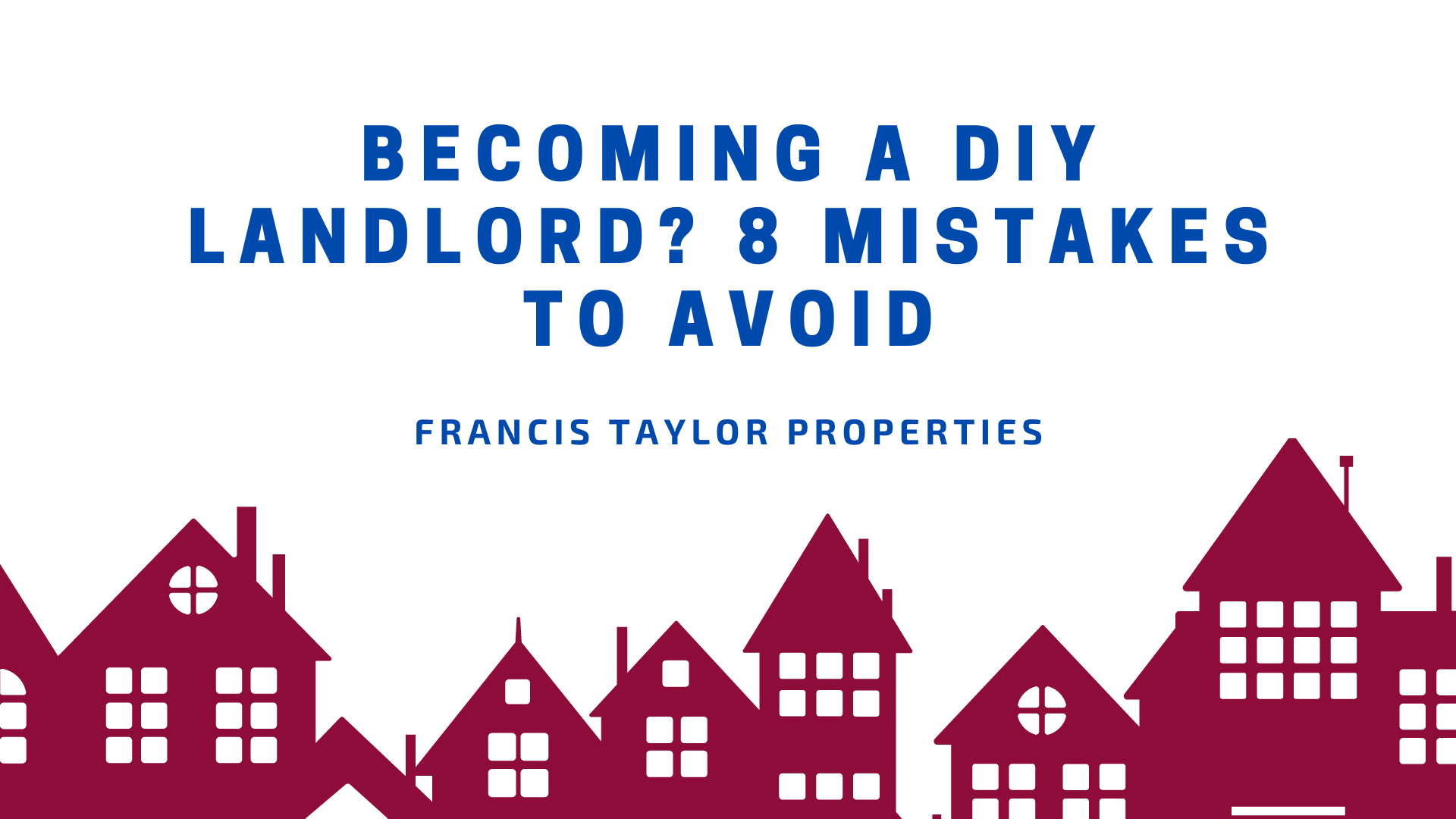As an individual embarking on the journey of managing rental properties independently, commonly referred to as DIY landlords, it's crucial to be aware of potential pitfalls to ensure smooth operations and maximize success.
In this article put together by Francis Taylor Properties, we'll explore eight common mistakes that DIY landlords often encounter and provide actionable tips to avoid them.
8 Pitfalls to Steer Clear of as a Landlord
1. Skipping Background Checks
One of the biggest mistakes a DIY landlord can make is skipping thorough background checks on prospective tenants. Without proper screening, you risk renting to individuals with a history of late payments, property damage, or even criminal activity.
Conducting background checks, including credit history, rental history, and criminal background, can help you make informed decisions and select reliable tenants.
Advantages of Conducting Background Checks
Comprehensive background checks help landlords facilitate informed decisions and select reliable tenants who adhere to lease terms.
Thorough screening minimizes property damage, neglect, and unauthorized alterations, saving landlords time, money, and stress related to maintenance.
Selecting financially responsible tenants ensures steady rental income and reduces the risk of disruptions, vacancies, and potential losses, bolstering overall financial stability.
2. Failure to Allocate for Vacancies
Many DIY landlords underestimate the impact of vacancies on their rental income. Failing to budget for vacancies can leave you financially strained during periods when your property is unoccupied.

It's essential to set aside funds to cover mortgage payments, utilities, and other expenses during vacancy periods to avoid financial hardship.
Advantages of Budgeting for Vacancies
Budgeting for vacancies helps DIY landlords avoid financial strain by setting aside funds for mortgage payments, utilities, and other expenses, ensuring continued financial stability.
Proper budgeting for vacancies ensures that DIY landlords are financially prepared to cover expenses during periods of tenant turnover, minimizing the impact on their cash flow and overall financial health.
By setting aside funds for vacancies, DIY landlords safeguard their long-term investment in rental properties, ensuring they can weather temporary income fluctuations and maintain financial sustainability over time.
3. Underestimation of Expenses
From maintenance and repairs to property taxes and insurance, being a landlord involves various expenses that can add up quickly. Underestimating these expenses can lead to financial strain and negatively impact your bottom line.
It's crucial to conduct thorough research and budget accurately for all anticipated costs associated with property ownership and management.
Advantages of Accurate Expense Budgeting
Accurate budgeting prevents financial strain by ensuring DIY landlords have sufficient funds for maintenance, repairs, taxes, and insurance.
By accurately estimating expenses, landlords avoid financial losses, maintaining stability and profitability in property investment.

Understanding true costs allows landlords to allocate resources effectively, maximizing returns on investment.
4. Ignoring Tenant Needs
Neglecting the needs of your tenants can lead to dissatisfaction, higher turnover rates, and negative reviews. As a DIY landlord, it's essential to maintain open communication with your tenants and promptly address any issues or concerns they may have.
By fostering positive relationships with your tenants, you can enhance tenant retention and create a more harmonious rental experience.
Advantages of Tenant-Centric Approach
By maintaining open communication and addressing concerns promptly, DIY landlords create a positive rental experience that encourages tenants to stay long-term.
By fostering positive relationships with tenants, DIY landlords minimize turnover rates and associated costs such as advertising for new tenants, screening applicants, and preparing the property for new occupancy.
Positive feedback and word-of-mouth recommendations from satisfied renters are beneficial to DIY landlords in maintaining high occupancy rates and promoting competitive rental prices.
5. Non-Compliance with Housing Regulations
Failure to comply with housing regulations and local ordinances can result in legal trouble, fines, and penalties. As a DIY landlord, it's your responsibility to stay informed about relevant laws and regulations governing rental properties in your area.
This includes ensuring proper maintenance, safety standards, and adherence to fair housing practices.

Advantages of Regulatory Compliance
Staying informed about housing regulations and local ordinances helps DIY landlords avoid legal trouble, fines, and penalties.
Complying with maintenance and safety standards ensures that rental properties are safe and habitable, reducing the risk of accidents and liability.
Adhering to fair housing practices fosters an inclusive environment, attracting a diverse tenant base and minimizing discrimination-related disputes.
6. Lack of Lease Enforcement
A solid lease agreement serves as an essential document to protect your rights as a landlord and outlining expectations for tenants. However, failing to enforce the terms of the lease can undermine its effectiveness and lead to disputes down the line.
As a DIY landlord, it's essential to enforce lease provisions consistently and address any violations promptly.
Advantages of Consistent Lease Enforcement
Consistently enforcing lease terms helps prevent disputes by clearly defining and upholding tenant and landlord responsibilities.
Enforcing lease provisions ensures that tenants adhere to agreed-upon rules, maintaining property standards and minimizing damage.
Addressing lease violations promptly safeguards the landlord's legal rights, providing a strong foundation for resolving issues effectively.
7. Neglecting Record-Keeping
Effective record-keeping is essential for managing rental properties efficiently and staying organized. Neglecting to keep accurate records of rental payments, maintenance requests, and other important documents can lead to confusion, errors, and legal disputes.

As a DIY landlord, invest in a reliable system for record-keeping to streamline operations and ensure compliance with legal requirements.
Advantages of Effective Record-Keeping
Maintaining accurate records streamlines property management operations, making it easier to track rental payments, maintenance requests, and important documents.
A reliable record-keeping system minimizes the risk of errors and confusion, ensuring accurate and up-to-date information is always available.
Keeping detailed records helps DIY landlords comply with legal requirements, reducing the risk of legal disputes and providing evidence if issues arise.
8. Procrastinating Evictions
Procrastinating evictions can exacerbate the situation and lead to financial losses. If a tenant consistently violates the lease agreement or fails to pay rent, it's crucial to take swift and decisive action to protect your interests.
Delaying evictions can prolong the problem and result in additional damages to your property.
Advantages of Prompt Eviction Action
Swiftly addressing lease violations and unpaid rent helps mitigate financial losses by promptly removing non-compliant tenants.
Quick eviction action prevents further damage to the property, reducing repair costs and maintaining property value.
Timely evictions allow for faster turnover, ensuring that the property can be rented to a responsible tenant sooner, maintaining a steady rental income.
Bottom Line
Becoming a DIY landlord can be a fulfilling endeavor, but it requires careful planning, diligence, and attention to detail.
By avoiding common mistakes such as skipping background checks, underestimating expenses, and neglecting tenant needs, you can set yourself up for success in property management.
At Francis Taylor Properties, we understand the challenges that DIY landlords face, and we're here to help. Our comprehensive property management services include tenant screening, rent collection, maintenance coordination, lease enforcement, and record-keeping.
With our expertise and personalized approach, we can help you navigate the complexities of property management and maximize the returns on your investment.
Contact us today to learn more about how we can support your journey as a DIY landlord.



